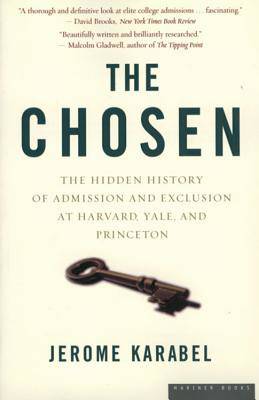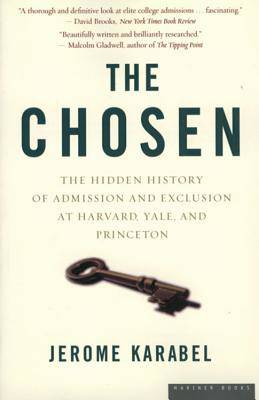
- Afhalen na 1 uur in een winkel met voorraad
- Gratis thuislevering in België vanaf € 30
- Ruim aanbod met 7 miljoen producten
- Afhalen na 1 uur in een winkel met voorraad
- Gratis thuislevering in België vanaf € 30
- Ruim aanbod met 7 miljoen producten
Zoeken
The Chosen
The Hidden History of Admission and Exclusion at Harvard, Yale, and Princeton
Jerome Karabel
Paperback | Engels
€ 34,45
+ 68 punten
Omschrijving
A landmark, revelatory history of admissions from 1900 to today--and how it shaped a nation
The competition for a spot in the Ivy League--widely considered the ticket to success--is fierce and getting fiercer. But the admissions policies of elite universities have long been both tightly controlled and shrouded in secrecy. In The Chosen, the Berkeley sociologist Jerome Karabel lifts the veil on a century of admission and exclusion at Harvard, Yale, and Princeton. How did the policies of our elite schools evolve? Whom have they let in and why? And what do those policies say about America? A grand narrative brimming with insights, The Chosen provides a lens through which to examine some of the main events and movements of America in the twentieth century--from immigration restriction and the Great Depression to the dropping of the atomic bomb and the launching of Sputnik, from the Cold War to the triumph of the market ethos. Many of Karabel's findings are astonishing: the admission of blacks into the Ivy League wasn't an idealistic response to the civil rights movement but a fearful reaction to inner-city riots; Yale and Princeton decided to accept women only after realizing that they were losing men to colleges (such as Harvard and Stanford) that had begun accepting "the second sex"; Harvard had a systematic quota on "intellectuals" until quite recently; and discrimination against Asian Americans in the 1980s mirrored the treatment of Jews earlier in the century. Drawing on decades of meticulous research, Karabel shines a light on the ever-changing definition of "merit" in college admissions, showing how it shaped--and was shaped by--the country at large. Full of colorful characters, from FDR and Woodrow Wilson to Kingman Brewster and Archibald Cox, The Chosen charts the century-long battle over opportunity--and offers a new and deeply original perspective on American history.Specificaties
Betrokkenen
- Auteur(s):
- Uitgeverij:
Inhoud
- Aantal bladzijden:
- 736
- Taal:
- Engels
Eigenschappen
- Productcode (EAN):
- 9780618773558
- Verschijningsdatum:
- 1/09/2006
- Uitvoering:
- Paperback
- Formaat:
- Trade paperback (VS)
- Afmetingen:
- 151 mm x 231 mm
- Gewicht:
- 988 g

Alleen bij Standaard Boekhandel
+ 68 punten op je klantenkaart van Standaard Boekhandel
Beoordelingen
We publiceren alleen reviews die voldoen aan de voorwaarden voor reviews. Bekijk onze voorwaarden voor reviews.











